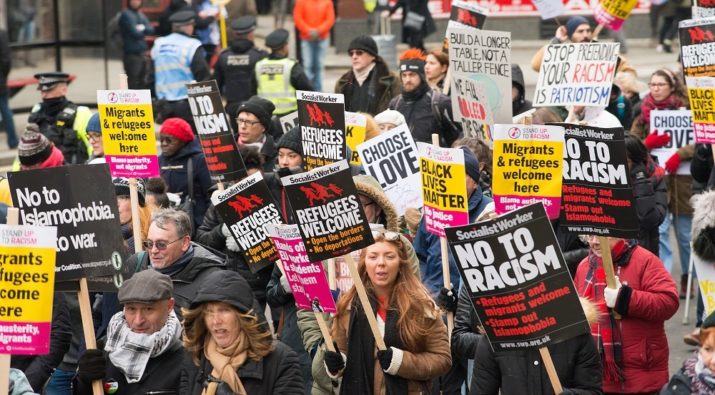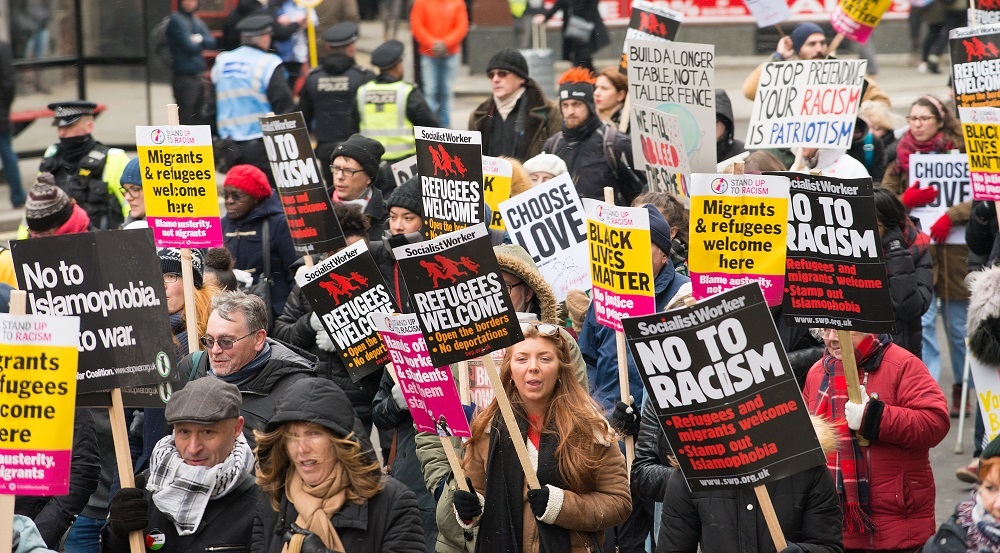

This is part of our special feature on Radicalism and Violence.
Britain’s far-right milieu has confirmed its new approach to demonstrating against Muslims and Islam. Following the permanent banning of the former leader of the English Defence League (EDL) and UK wing of PEGIDA (or ‘Patriotic Europeans Against the Islamisation of the West’), Tommy Robinson, from Twitter for hateful conduct and the conviction of two of Britain First’s leaders, Jayda Fransen and Paul Goulding, for religiously aggravated harassment, key figures from within the UK far-right and wider counter-jihadi movement have come together under the banner of defending free speech.
The catalyst for this shift in focus of course, relates to activities involving – and more appropriately, targeting – Muslims and Islam. For Robinson, he was banned after tweeting that “Islam promotes killing people;” Fransen and Goulding were jailed for a series of hate crimes against Muslims, some of which involved screaming “pedophile” at Muslims in a shop and shouting Islamophobic abuse through the letterbox of a Muslim man who had been a defendant in the trial of another Muslim. These, and indeed other incidents, were filmed Britain First’s supporters and uploaded to the internet for all to view.
While the prosecutor in the trial of Fransen and Goulding stated “…these defendants were not merely exercizing their right to free speech but were instead aiming religiously aggravated abuse at innocent members of the public,” many of their supporters strongly disagree. For them, Robinson, Fransen, and Goulding among others are being censured. As they see it, such censuring is further evidence of pandering to Muslims and Islam in Britain – or “dhimmitude” as some leading counter-jihadi intellectuals refer to it.
The catalyst for this can be traced back to March of this year when the German founder of PEGIDA, Lutz Bachmann was denied entry to the UK on the basis his presence was deemed not to be “conducive to the public good.” Travelling to London to deliver a talk on the need to protect free speech, Bachmann was in fact a replacement for Martin Sellner, the Austrian leader of Generation Identity, who had been previously deported for the exact same reason as Bachmann. The direct response to this was for Robinson to deliver Sellner’s speech in absentia on Sunday, March 18th, at Speakers Corner, a space in London’s Hyde Park where public speaking, debate, and discussion has been historically allowed.
Following the subsequent banning of Robinson from Twitter, a much larger demonstration was organized. Taking place on Sunday, May 6th, up to 3,000 people turned up in support of the “Day for Freedom.” Fronted by Robinson, other speakers included: Gerrard Batten, leader of the UK Independence Party (UKIP); the co-founder of Vice, Gavin McInnes; YouTube personality Sargon of Akkad; former UKIP leadership candidate and now leader of the For Britain political party, Anne Marie Waters; and former Breitbart senior editor, Milo Yiannopoulos. Those attending the demonstration – which was supported by the Democratic Football Lads Alliance, a splinter group of the far-right Football Lads Alliance (FLA) – were privy to speeches attacking censorship, political correctness, cultural Marxism, multiculturalism and of course, Islam.
The far-right’s championing of free speech is an interesting albeit flawed development, an argument best articulated by Nesrine Malik. As she notes, free speech is no longer a value but as she puts it, “a loophole exploited with impunity.” For her, demonstrations (like the one that took place in early May) are falsely premised on the basis that “no-platforming” someone with abhorrent or unfounded views is a form of censorship. For Robinson and his ilk, the rationale is that if their banning is allowed without challenge or question, then where and what next: what other rights and values will be stripped away? As Malik rightly counters, given these newfound defenders of free speech are not defending the right to hear from pedophiles or radical Muslim clerics (for instance) is in itself evidence enough that they too know that legislation is necessary to regulate unpalatable or illegal views.
Nonetheless, championing free speech by the far-right not only resonates with how it has previously targeted Muslims and Islam, but so too does it sound to a wider audience as if it “makes sense.” As regards to the former, the far-right has been extolling the need to defend Britain – and also Europe – from Muslims and Islam for more than a decade. Evidenced on allegations of “invasion” and “Islamification,”’ the argument continues on the basis that Muslims are “taking over” from the inside: via ongoing immigration, high birth-rates, and insidiously eradicating what “we” stand for and who “we” are. An example of the latter is how, in 2014, “halal hysteria”saw some British politicians, newspapers, and far-right groups being outraged that “millions” were seemingly eating halal meat without knowing it. As the Daily Mail put it, this was evidence of a “stealth” takeover of Britain’s supermarkets by Muslims. Key to this and wider “takeover” narratives is the notion that Muslims and Islam are destroying “our” values, “our” culture and “our” way of life, thereby prompting the need to defend and protect who and what the far-right perceive “us” to be. If the media and politicians are inferring this, when it is reiterated by the far-right then it can only be seen to make sense. Right?
It is on this basis that free speech is being championed.
While there is a very basic driver to the championing of free speech by the far-right and counter-jihadi milieu – they want to be openly racist and Islamophobic without censure – there is another more insidious driver. By championing free speech, they are giving “evidence” and subsequently credence to the argument that “our” values are being eroded. Drawing on selective notions of what Britain has historically stood and indeed fought for – Britain’s participation in the Second World War is a current feature of far-right narratives – those championing free speech are doing so in a manner that is far from neutral.
At present, the extent to which this new front in the perceived defense of Britain from Muslims and Islam will be able to garner wider support from the general public remains unclear. As such, it is likely that many of those attending the recent demonstration in London would have attended similar demonstrations organised by far-right groups. While so, given the recent and quite unprecedented success of the Football Lads Alliance last year under the banner of opposing “extremism,” we should not underestimate the potential that mobilizing people on the basis of emotive and sensitive social issues; be that extremism or free speech. If nothing else, it is a timely reminder that Britain’s far-right and counter-jihadi milieu is not only catalyzed and motivated but so too becoming increasingly innovative in its approach to promoting bigotry and hate – re-dressing the language of liberty and “Enlightenment values” in a far right hue of deepest black.
Chris Allen is a Senior Fellow at CARR, and an Associate Professor in Hate Studies at the University of Leicester.
Photo: London, UK. 17th March 2018. EDITORIAL – Thousands gathered at Portland Place, London, for the March Against Racism national demonstration, in protest of the dramatic rise in race related attack | Shutterstock
Published on October 2, 2018.




